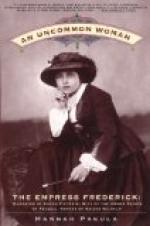It was the marriage festival of this young German princess with the heir to the Russian throne which was celebrated in the imperial palace at St. Petersburg—a festival of splendor and enthusiasm, as it was attended by two women of the most exciting beauty, Elizabeth the present and Catharine the future empress—the one gorgeous with the splendor of the present, the other irradiated with the glory of the future. People looked at the fair youthful face of Catharine, and sought to read in her majestic high forehead the hopes that Russia might cherish of her! It was, therefore, a festival of the present and future that was there and then celebrated, and the magnates humbly prostrated themselves before this new star, and threw themselves upon the earth before the ever-new sun of imperial majesty which shone upon them in the person of Elizabeth.
Catharine with a joyful spirit and a proud smile laid her hand in that of Peter, and as she stepped with him to the altar she thought: “I do this that I may one day be empress! and as I can reach that position in no other way—well, then, let them call me the wife of this under-aged boy! I will suffer it until the time when I shall no longer suffer, but command.”
With such thoughts did Catharine become the wife of the Grand-duke Peter, who, as he with a loud and solemn “yes” vowed eternal truth to his young wife, looked at the Countess Woronzow, and both exchanged a stolen smile and a glowing glance of love.
“They may henceforth call this proud Catharine my wife,” thought Peter, “but I shall never love her, as my heart will ever belong to my dear Woronzow! But Elizabeth has decided that Catharine shall be my wife. I accommodate myself to her command, and obey now, that I may one day command! But then woe to the wife this day forced upon me!”
And when the ceremony was ended, the new-married pair received with smiling faces and radiant glances the congratulations of the court, which in loud and ecstatic exclamations commended the love and happiness of this young princely pair.
On the same day a second marriage was celebrated in this same imperial palace, perhaps not so splendid, but certainly a happier one, for it was love that united the two—love had overcome Elizabeth’s aversion to marriage, and decided her to raise her dear Alexis Razumovsky to the position of her husband—love, and also a little superstition! As the son born to Elizabeth some months previously had died soon after its birth, and in this dispensation Elizabeth recognized the punishment of heaven in disapproval of her connection with Alexis, she shudderingly, remembered the words spoken by Eleonore Lapuschkin, and her heart was filled with fear for the children which the future might bring her.
“I will destroy the curse which this Countess Lapuschkin has pronounced against my children,” thought Elizabeth, as she now for the second time felt herself to be a mother. “If God blesses my children, the curse of no human being can affect them, and this revengeful prayer of the countess will have no more power when the priest of God has consented and blessed the child now quietly reposing under my heart!”




